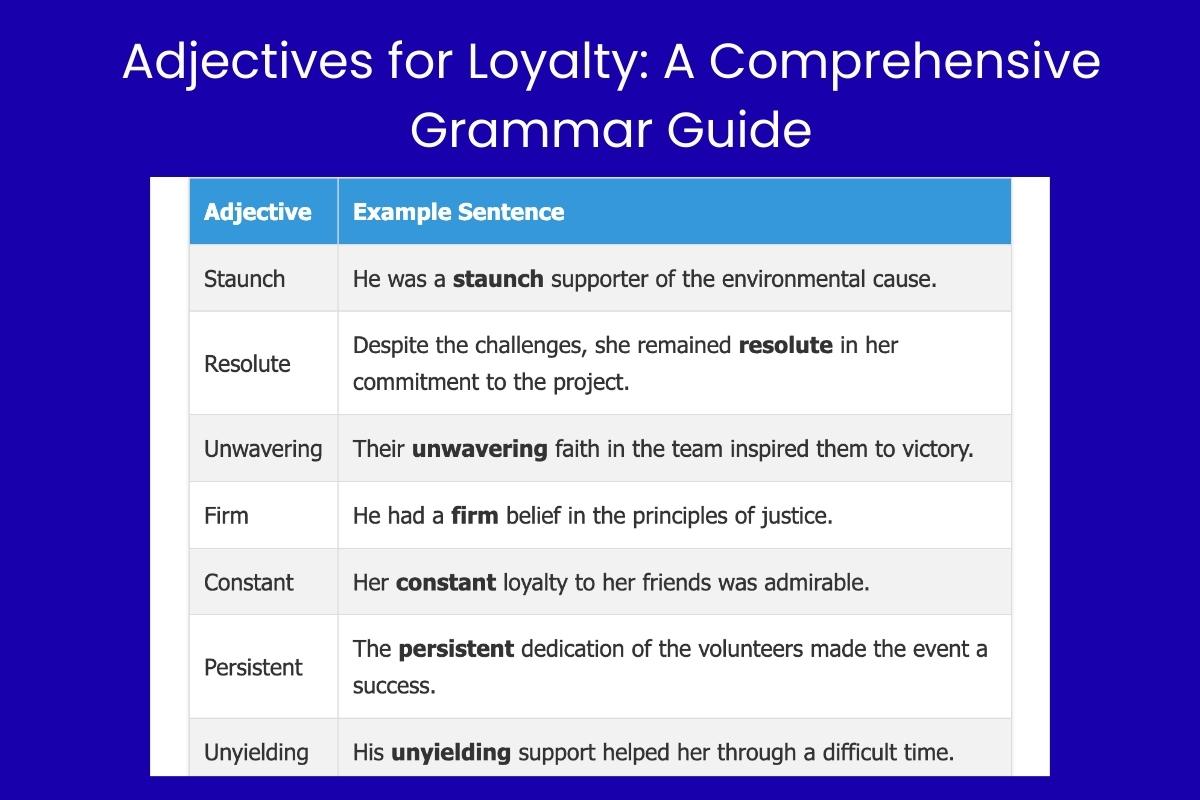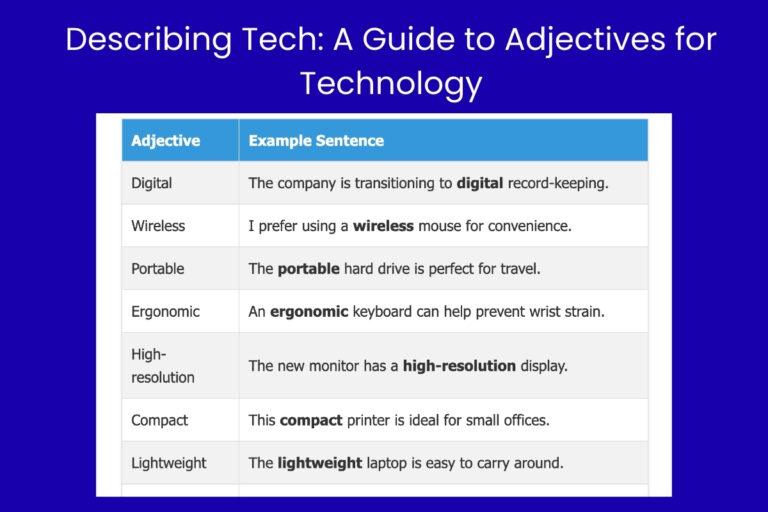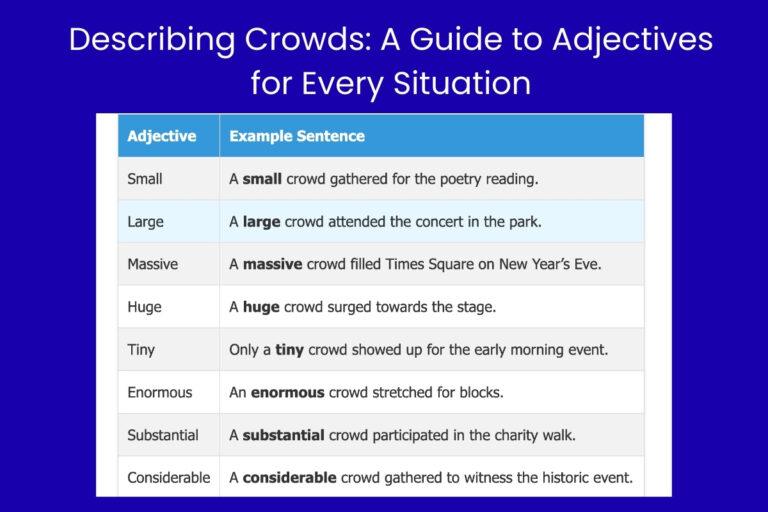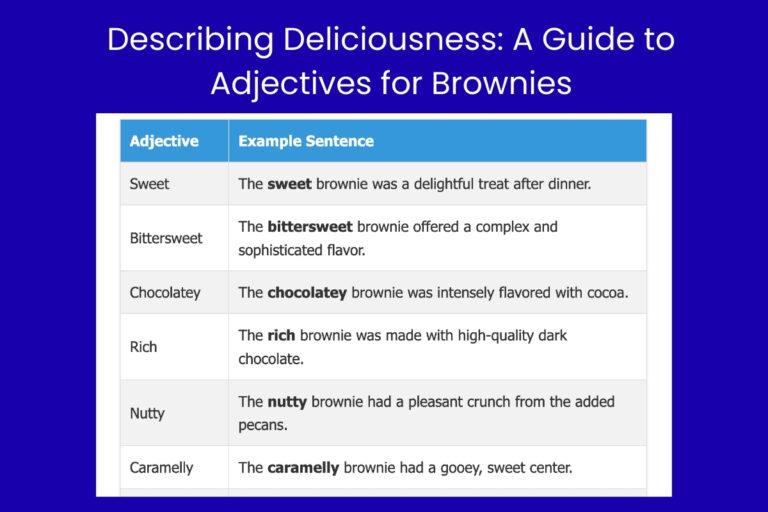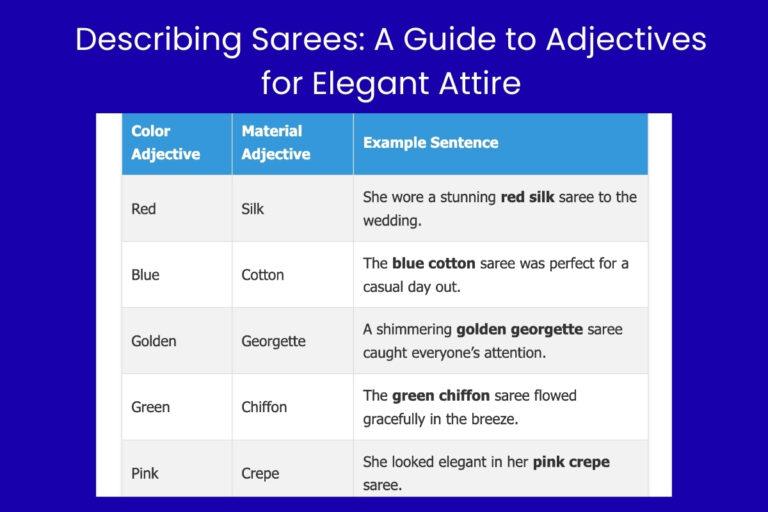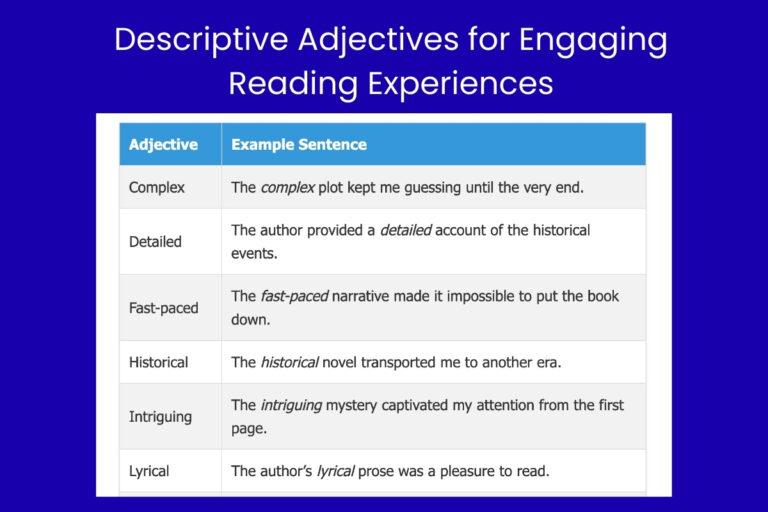Adjectives for Loyalty: A Comprehensive Grammar Guide
Understanding adjectives that describe loyalty is crucial for effective communication. These words add depth and precision to our descriptions of character, relationships, and even brands. This article provides a comprehensive guide to adjectives for loyalty, covering their definitions, usage, and common pitfalls. Whether you’re an English language learner, a writer, or simply someone looking to enhance their vocabulary, this guide will equip you with the knowledge to use these adjectives accurately and confidently.
Table of Contents
- Introduction
- Definition of Loyalty Adjectives
- Structural Breakdown
- Types and Categories of Loyalty Adjectives
- Examples of Loyalty Adjectives in Sentences
- Usage Rules for Loyalty Adjectives
- Common Mistakes with Loyalty Adjectives
- Practice Exercises
- Advanced Topics
- Frequently Asked Questions (FAQ)
- Conclusion
Introduction
Loyalty, a cornerstone of strong relationships and trustworthy character, is a concept frequently described using a rich array of adjectives. Selecting the most appropriate adjective can significantly impact the nuance and accuracy of your message. This article delves into the world of adjectives that depict loyalty, providing a comprehensive overview of their meanings, usage, and common errors to avoid. Mastering these words will not only enhance your vocabulary but also improve your ability to express complex ideas related to faithfulness and commitment.
This guide is designed for a wide audience, from English language learners seeking to expand their vocabulary to writers aiming for greater precision in their descriptions. By understanding the subtle differences between adjectives like “devoted,” “staunch,” and “faithful,” you can convey the specific type of loyalty you intend, enriching your communication and creating a more profound connection with your audience. This article will equip you with the tools to effectively describe loyalty in various contexts, ensuring your message resonates with clarity and impact.
Definition of Loyalty Adjectives
Loyalty adjectives are words that describe the quality of being loyal, which involves steadfastness, faithfulness, and devotion to a person, group, cause, or idea. These adjectives characterize the degree and nature of commitment, providing insight into the strength and reliability of the bond. They help to paint a picture of someone’s character or the nature of a relationship, adding depth and meaning to our understanding of the subject.
These adjectives function primarily to modify nouns, providing more information about the noun’s attributes or qualities related to loyalty. They can be used to describe a person’s character (e.g., a loyal friend), a group’s adherence to a cause (e.g., a devoted following), or even a brand’s reputation (e.g., a reliable brand). The context in which these adjectives are used is critical, as the specific meaning can vary depending on the situation and the noun being modified. Understanding these nuances is essential for effective and accurate communication.
Structural Breakdown
Loyalty adjectives, like most adjectives, typically precede the noun they modify (attributive position) or follow a linking verb such as “be,” “seem,” or “become” (predicative position). Understanding this basic structure is crucial for constructing grammatically correct sentences. However, some adjectives can also be used in more complex structures, such as after nouns in certain idiomatic expressions or in appositive phrases that offer additional information.
The structure of a sentence using a loyalty adjective is often straightforward. For example, in the sentence “He is a faithful employee,” the adjective “faithful” directly modifies the noun “employee.” Similarly, in the sentence “She remained devoted to her family,” the adjective “devoted” follows the linking verb “remained” and describes the subject “she.” Recognizing these patterns helps in both understanding and constructing sentences that accurately convey the intended meaning of loyalty.
Here’s a breakdown of the two main positions:
- Attributive Position: The adjective comes before the noun. Example: “The steadfast knight defended the castle.”
- Predicative Position: The adjective follows a linking verb. Example: “The dog seemed loyal.”
Types and Categories of Loyalty Adjectives
Loyalty adjectives can be categorized based on the specific aspect of loyalty they emphasize. These categories help to differentiate the nuances of loyalty and provide a more precise understanding of their meanings. The most common categories include adjectives describing steadfastness, devotion, faithfulness, allegiance, and reliability.
Adjectives Describing Steadfastness
Steadfastness refers to unwavering commitment and resilience in the face of challenges. Adjectives in this category emphasize the strength and durability of loyalty. These words suggest a commitment that remains firm despite difficulties or temptations. They highlight the unyielding nature of the loyalty being described.
Examples of adjectives describing steadfastness include: staunch, resolute, unwavering, firm, and constant. These words convey a sense of unwavering dedication and commitment to a person, cause, or belief. They suggest that the loyalty is strong and unlikely to be shaken by external pressures or internal doubts.
Adjectives Describing Devotion
Devotion implies a deep and intense love or dedication. Adjectives in this category emphasize the emotional aspect of loyalty, highlighting the strong affection and commitment that motivate the loyalty. These words suggest a willingness to go above and beyond for the object of their loyalty.
Examples of adjectives describing devotion include: devoted, ardent, zealous, dedicated, and passionate. These words convey a sense of deep affection and unwavering commitment. They suggest that the loyalty is driven by a strong emotional connection and a willingness to make sacrifices.
Adjectives Describing Faithfulness
Faithfulness refers to loyalty and trustworthiness, particularly in relationships or commitments. Adjectives in this category emphasize the reliability and trustworthiness of the loyalty, highlighting the adherence to promises and obligations. These words suggest a commitment that is based on trust and integrity.
Examples of adjectives describing faithfulness include: faithful, trustworthy, true, loyal, and dutiful. These words convey a sense of reliability and adherence to commitments. They suggest that the loyalty is based on trust and a willingness to fulfill obligations.
Adjectives Describing Allegiance
Allegiance refers to loyalty or commitment to a nation, cause, or leader. Adjectives in this category emphasize the formal or official aspect of loyalty, highlighting the adherence to rules, principles, or authority. These words suggest a commitment that is based on duty and obligation.
Examples of adjectives describing allegiance include: patriotic, nationalistic, committed, submissive, and obedient. These words convey a sense of duty and adherence to authority. They suggest that the loyalty is based on a formal commitment or obligation.
Adjectives Describing Reliability
Reliability refers to the quality of being dependable and consistent. Adjectives in this category emphasize the trustworthiness and dependability of the loyalty, highlighting the ability to be counted on in times of need. These words suggest a commitment that is based on consistency and dependability.
Examples of adjectives describing reliability include: reliable, dependable, consistent, stable, and trusting. These words convey a sense of trustworthiness and dependability. They suggest that the loyalty is based on a proven track record of consistency and reliability.
Examples of Loyalty Adjectives in Sentences
Understanding how loyalty adjectives are used in sentences is crucial for mastering their usage. The following tables provide examples of each category of loyalty adjectives in various contexts. These examples illustrate the nuances of each adjective and how they contribute to the overall meaning of the sentence.
The table below showcases examples of sentences using adjectives describing steadfastness.
| Adjective | Example Sentence |
|---|---|
| Staunch | He was a staunch supporter of the environmental cause. |
| Resolute | Despite the challenges, she remained resolute in her commitment to the project. |
| Unwavering | Their unwavering faith in the team inspired them to victory. |
| Firm | He had a firm belief in the principles of justice. |
| Constant | Her constant loyalty to her friends was admirable. |
| Persistent | The persistent dedication of the volunteers made the event a success. |
| Unyielding | His unyielding support helped her through a difficult time. |
| Solid | They built a solid and enduring friendship over the years. |
| Stable | The company has a stable base of loyal customers. |
| Durable | The durable loyalty of the fans kept the team going. |
| Inflexible | His inflexible commitment to his principles was both his strength and weakness. |
| Adamant | She was adamant in her support for her friend. |
| Immovable | His immovable dedication to the cause inspired many. |
| Fixed | He had a fixed determination to succeed. |
| Rooted | Their loyalty was deeply rooted in shared values. |
| Entrenched | The company had an entrenched culture of loyalty. |
| Established | They had an established reputation for loyalty. |
| Confirmed | Her loyalty was confirmed through years of service. |
| Proven | He was a proven friend, always there in times of need. |
| Tried | Their tried and true loyalty was invaluable. |
The table below showcases examples of sentences using adjectives describing devotion.
| Adjective | Example Sentence |
|---|---|
| Devoted | She was a devoted mother, always putting her children first. |
| Ardent | He was an ardent admirer of her talent. |
| Zealous | The zealous fans cheered enthusiastically for their team. |
| Dedicated | She was a dedicated volunteer, spending countless hours helping others. |
| Passionate | He was passionate about his work and always gave it his all. |
| Fervent | The fervent supporters rallied behind the candidate. |
| Avid | She was an avid reader and a loyal customer of the bookstore. |
| Intense | His intense loyalty to his family was evident in everything he did. |
| Profound | She had a profound sense of loyalty to her values. |
| Deep | His deep devotion to his country led him to serve in the military. |
| Unswerving | Her unswerving devotion to her faith was inspiring. |
| Unconditional | They offered unconditional love and devotion. |
| Unreserved | He gave his unreserved support to the project. |
| Wholehearted | She approached the task with wholehearted dedication. |
| Complete | His complete devotion was to his art. |
| Utter | They showed utter dedication to their cause. |
| Total | He displayed total commitment to his team. |
| Absolute | Her absolute loyalty was unquestionable. |
| Extreme | They showed extreme dedication to their job. |
| Radical | His radical devotion to change was controversial. |
The table below showcases examples of sentences using adjectives describing faithfulness.
| Adjective | Example Sentence |
|---|---|
| Faithful | He was a faithful husband and a loving father. |
| Trustworthy | She was a trustworthy friend, always keeping her promises. |
| True | He was a true friend, always there in times of need. |
| Loyal | The dog was a loyal companion, always by his side. |
| Dutiful | He was a dutiful son, always respecting his parents. |
| Reliable | She is a reliable source of information. |
| Honest | He gave an honest account of what happened. |
| Sincere | They offered sincere apologies for the mistake. |
| Genuine | His concern was genuine and heartfelt. |
| Veritable | They were a veritable example of loyalty. |
| Authentic | She had an authentic sense of loyalty. |
| Legitimate | They had a legitimate claim to loyalty. |
| Actual | They showed their actual loyalty by their actions. |
| Real | He was a real and faithful friend. |
| Unfeigned | Their loyalty was unfeigned and heartfelt. |
| Bona fide | He was a bona fide loyal supporter. |
| Valid | They had a valid reason for their loyalty. |
| Sound | They had a sound system of loyalty. |
| Strong | They had a strong sense of loyalty. |
| Enduring | Their loyalty was enduring and steadfast. |
The table below showcases examples of sentences using adjectives describing allegiance.
| Adjective | Example Sentence |
|---|---|
| Patriotic | He was a patriotic citizen, always putting his country first. |
| Nationalistic | The nationalistic fervor swept through the country. |
| Committed | She was committed to the cause of social justice. |
| Submissive | The soldiers were submissive to their commander’s orders. |
| Obedient | The dog was obedient and followed his owner’s commands. |
| Compliant | The employees were compliant with the new regulations. |
| Tributary | The tributary states pledged their allegiance to the empire. |
| Subject | They were subject to the king’s rule. |
| Bound | They were bound by their oath of allegiance. |
| Fated | They felt fated to serve their country. |
| Destined | They were destined to be loyal followers. |
| Pledged | They were pledged to uphold the constitution. |
| Sworn | They were sworn to protect the realm. |
| Vowed | They had vowed their allegiance to the cause. |
| Devoted | They were devoted to their leader. |
| Dedicated | They were dedicated to their duty. |
| Attached | They were deeply attached to their nation. |
| Affiliated | They were affiliated with the political party. |
| Aligned | Their values were aligned with the organization. |
| Associated | They were associated with the revolutionary movement. |
The table below showcases examples of sentences using adjectives describing reliability.
| Adjective | Example Sentence |
|---|---|
| Reliable | He was a reliable employee, always on time and prepared. |
| Dependable | She was a dependable friend, always there when you needed her. |
| Consistent | His consistent performance made him a valuable asset to the team. |
| Stable | The company had a stable workforce with low turnover. |
| Trusting | He had a trusting nature and always gave people the benefit of the doubt. |
| Sure | They were a sure source of support. |
| Certain | They were certain to fulfill their promises. |
| Guaranteed | Their loyalty was guaranteed by their actions. |
| Definite | They had a definite commitment to the team. |
| Infallible | Their loyalty was seen as infallible. |
| Unfailing | They showed unfailing support in times of need. |
| Predictable | Their loyalty was as predictable as the sunrise. |
| Scheduled | They had a scheduled display of loyalty. |
| Planned | They had a planned show of support. |
| Arranged | They had an arranged demonstration of loyalty. |
| Set | They had a set time to pledge their allegiance. |
| Fixed | They had a fixed routine to show their loyalty. |
| Systematic | Their loyalty was part of a systematic approach. |
| Methodical | They had a methodical way of showing their support. |
| Regulated | Their loyalty was regulated by strict rules. |
Usage Rules for Loyalty Adjectives
Using loyalty adjectives correctly requires understanding their specific meanings and connotations. While many of these adjectives may seem interchangeable, subtle differences in their meanings can significantly impact the message you are trying to convey. It’s essential to consider the context and the specific aspect of loyalty you want to emphasize when choosing the appropriate adjective.
For instance, “faithful” and “loyal” are often used interchangeably, but “faithful” often implies adherence to a promise or commitment, while “loyal” suggests a more general sense of allegiance. Similarly, “devoted” implies a deep emotional connection, while “steadfast” emphasizes unwavering commitment. Choosing the right adjective can add depth and precision to your writing, ensuring that your message resonates with clarity and impact.
Here are some key usage rules to keep in mind:
- Context is Key: The meaning of a loyalty adjective can change depending on the context.
- Nuance Matters: Pay attention to the subtle differences between similar adjectives.
- Avoid Overuse: Using the same adjective repeatedly can make your writing monotonous.
- Consider Connotations: Be aware of the emotional associations of each adjective.
- Use a Thesaurus: When in doubt, consult a thesaurus to find the most appropriate word.
Common Mistakes with Loyalty Adjectives
One common mistake is using loyalty adjectives interchangeably without considering their subtle differences in meaning. For example, using “faithful” when “loyal” is more appropriate, or vice versa. Another common error is overusing certain adjectives, leading to repetitive and unengaging writing. Additionally, using an adjective with the wrong connotation can unintentionally alter the meaning of the sentence.
To avoid these mistakes, it’s essential to understand the specific meanings and connotations of each adjective. Pay attention to the context in which you are using the adjective and choose the word that best conveys the intended meaning. Use a thesaurus to explore alternative options and avoid overuse. By being mindful of these common mistakes, you can ensure that you are using loyalty adjectives accurately and effectively.
Here are some examples of common mistakes and their corrections:
| Incorrect | Correct | Explanation |
|---|---|---|
| He was a loyal husband to his wife’s promises. | He was a faithful husband to his wife. | “Faithful” is more appropriate when referring to marital vows. |
| She was a steadfast fan of the team. | She was a devoted fan of the team. | “Devoted” better conveys the emotional attachment of a fan. |
| The company has a very loyal customer base. They are so loyal! | The company has a very loyal customer base. They are highly dedicated to our brand! | Avoid overuse of “loyal” by using synonyms like “dedicated.” |
| He was a patriotic friend. | He was a loyal friend. | “Patriotic” refers to loyalty to one’s country, not to individuals. |
| The obidient citizen followed the law. | The obedient citizen followed the law. | Correct the spelling of “obedient.” |
Practice Exercises
Test your understanding of loyalty adjectives with these practice exercises. Choose the most appropriate adjective from the options provided to complete each sentence. These exercises will help you reinforce your knowledge and improve your ability to use these adjectives accurately.
Exercise 1: Choose the best adjective to complete the sentence.
| Question | Options | Answer |
|---|---|---|
| 1. He was a ______ supporter of the political party, attending every rally and donating generously. | a) faithful b) staunch c) devoted d) reliable | b) staunch |
| 2. She remained ______ to her principles, even when faced with criticism and opposition. | a) loyal b) steadfast c) patriotic d) reliable | b) steadfast |
| 3. The dog was a ______ companion, always by his owner’s side and ready to protect him. | a) faithful b) staunch c) devoted d) reliable | a) faithful |
| 4. The company has a ______ customer base, with many customers returning year after year. | a) faithful b) staunch c) devoted d) loyal | d) loyal |
| 5. He was a ______ son, always respecting his parents and fulfilling his obligations. | a) faithful b) staunch c) dutiful d) reliable | c) dutiful |
| 6. She showed ______ dedication to her work, often staying late to complete tasks. | a) faithful b) staunch c) devoted d) reliable | c) devoted |
| 7. The team had ______ teamwork, with each member relying on the other. | a) faithful b) staunch c) devoted d) reliable | d) reliable |
| 8. He was a ______ member of the community, always willing to help others. | a) faithful b) staunch c) devoted d) committed | d) committed |
| 9. The ______ soldier followed his commander’s orders without question. | a) faithful b) staunch c) devoted d) obedient | d) obedient |
| 10. She was a ______ friend, always there to listen and offer support. | a) trustworthy b) staunch c) devoted d) reliable | a) trustworthy |
Exercise 2: Rewrite the following sentences using a different loyalty adjective with a similar meaning.
| Original Sentence | Rewritten Sentence |
|---|---|
| 1. He was a staunch advocate for environmental protection. | He was a steadfast advocate for environmental protection. |
| 2. She was a devoted follower of the guru. | She was a dedicated follower of the guru. |
| 3. The dog was a faithful companion to the elderly woman. | The dog was a loyal companion to the elderly woman. |
| 4. The company had a loyal customer base. | The company had a reliable customer base. |
| 5. The soldier was obedient to his commanding officer. | The soldier was submissive to his commanding officer. |
| 6. Her commitment to the cause was unwavering. | Her dedication to the cause was unswerving. |
| 7. They were a steadfast team. | They were a reliable team. |
| 8. His allegiance to the cause was unquestionable. | His loyalty to the cause was unquestionable. |
| 9. She was a passionate supporter of the arts. | She was a zealous supporter of the arts. |
| 10. They formed an enduring friendship. | They formed a lasting friendship. |
Advanced Topics
For advanced learners, exploring the nuances of loyalty adjectives in literature and rhetoric can provide a deeper understanding of their power and impact. Analyzing how authors use these adjectives to develop characters, create emotional resonance, and persuade their audience can be a valuable exercise. Additionally, examining the historical and cultural contexts in which these adjectives are used can reveal subtle shifts in meaning and connotation over time.
Another advanced topic is the use of loyalty adjectives in marketing and branding. Companies often use these adjectives to create a sense of trust and reliability with their customers. Understanding how these adjectives are used in advertising and public relations can provide insights into the persuasive power of language. Furthermore, exploring the ethical implications of using loyalty adjectives in marketing can be a thought-provoking exercise.
Finally, consider the role of loyalty adjectives in political discourse. Politicians frequently use these adjectives to rally support and create a sense of unity among their followers. Analyzing how these adjectives are used in speeches and campaigns can reveal the ways in which language is used to shape public opinion. Examining the potential for manipulation and misuse of these adjectives is also an important consideration.
Frequently Asked Questions (FAQ)
Here are some frequently asked questions about loyalty adjectives:
- What is the difference between “loyal” and “faithful”?
“Loyal” generally refers to a strong feeling of support or allegiance, while “faithful” often implies adherence to a promise or commitment. A person can be loyal to a friend, but faithful to a spouse or a promise.
- When should I use “steadfast” instead of “loyal”?
“Steadfast” emphasizes unwavering commitment and resilience in the face of challenges. Use “steadfast” when you want to highlight the strength and durability of the loyalty.
- What is the connotation of “devoted”?
“Devoted” implies a deep and intense love or dedication. It suggests a willingness to go above and beyond for the object of their loyalty. The connotation is highly emotional and passionate.
- Can “patriotic” be used to describe loyalty to a person?
No, “patriotic” specifically refers to loyalty to one’s country. It should not be used to describe loyalty to an individual.
- What are some synonyms for “reliable”?
Some synonyms for “reliable” include dependable, trustworthy, consistent, and stable. Choosing the right synonym depends on the specific context and the aspect of reliability you want to emphasize.
- How can I avoid overusing loyalty adjectives in my writing?
Use a thesaurus to explore alternative options and vary your vocabulary. Also, consider using strong verbs and vivid descriptions to convey the message of loyalty without relying solely on adjectives.
- Is it possible to be too loyal?
Yes, excessive loyalty, sometimes termed “blind loyalty,” can be detrimental if it leads to supporting unethical or harmful actions. Healthy loyalty involves critical thinking and moral judgment.
- How are loyalty adjectives used in marketing?
Companies use loyalty adjectives like “reliable,” “trustworthy,” and “faithful” to build brand trust and encourage customer loyalty. These words are often used in advertising and public relations to create a positive image of the company and its products.
Conclusion
Mastering adjectives for loyalty enhances your ability to express complex ideas about commitment, faithfulness, and devotion. Understanding the subtle differences between these words allows for more precise and impactful communication. Throughout this guide, we’ve explored various categories of loyalty adjectives, provided numerous examples, and addressed common mistakes to avoid. This comprehensive knowledge will empower you to use these adjectives with confidence and accuracy.
Remember, the key to effective usage lies in understanding the context and choosing the adjective that best conveys the intended meaning. Practice is essential for solidifying your understanding and developing fluency. By continuing to expand your vocabulary and paying attention to the nuances of language, you can elevate your communication skills and create more meaningful connections with your audience. Keep exploring, keep practicing, and you’ll continue to improve your mastery of English grammar.
